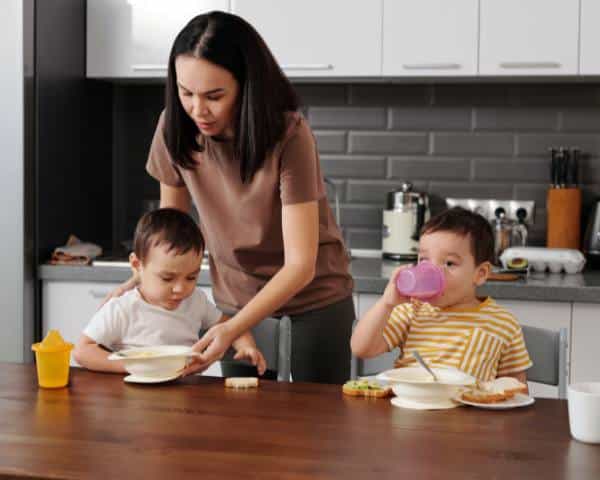
In a society where nutrition education often focuses solely on sharing knowledge, it is time to reconsider our approach to food and nutrition. Nutrition education needs an innovative approach to empower children, families, and educators.
Shifting Perspectives: Moving Beyond Picky Eaters.
The label of “picky eaters” can significantly impact how children perceive themselves and how others perceive them. This label often provides an excuse for food refusal and creates negative associations with eating. To empower children and promote a healthier attitude towards food, it is crucial to move away from this restrictive label.
Language plays a pivotal role in shaping children’s attitudes towards food. The words we choose can either support or hinder the development of a positive relationship with food. By selecting our language carefully, we can positively influence their perception and understanding of nutrition.
Avoiding terms like “good” or “bad” when describing food is essential. Instead, we should emphasise balance, frequency, and nourishment.
Encouraging children to view food as a source of energy, growth, and overall well-being . By adopting language that avoids guilt or restriction, children can develop a positive and intuitive understanding of their nutritional needs.
Parents play a pivotal role in shaping their children’s attitudes towards food.
Encouraging children to contribute to mealtimes can foster a sense of agency, responsibility, and ownership over their food choices.
Here are some examples of how children can actively participate in mealtime activities:
- Meal planning: Involve children in the meal planning process by allowing them to suggest and choose some of the meals or ingredients. This gives them a sense of autonomy and helps them feel invested in the mealtime experience.
- Grocery shopping: Take children along for grocery shopping trips and let them participate in selecting fruits, vegetables, or other items. They can learn about different foods, compare options, and make choices within reason.
- Setting the table: Assign children the task of setting the table before meals. They can arrange plates, cutlery, napkins, and even decorate the table with flowers or place mats. This responsibility helps them feel involved in the overall meal setup.
- Food preparation: Depending on their age and skill level, children can assist with food preparation tasks such as washing vegetables, stirring ingredients, or helping assemble simple dishes. This involvement allows them to see the process of transforming ingredients into a meal.
- Serving themselves: Allow children to serve themselves from a variety of dishes at the table. This enables them to make choices about portion sizes and select the foods they want to eat. It also promotes independence and self-regulation.
- Sharing recipes or ideas: Encourage children to share their favourite recipes, food combinations, or meal ideas. This could involve discussing their preferences, suggesting creative ways to use ingredients, or even teaching others how to make a dish they enjoy. Their input can add diversity and excitement to mealtime discussions.
- Cleanup and dishwashing: Assign age-appropriate tasks for children to help with cleanup after meals. This can include clearing the table, rinsing dishes, loading the dishwasher, or wiping down surfaces. Engaging in post-meal cleanup instills a sense of responsibility and contributes to a shared mealtime experience.
Remember to provide guidance, supervision, and age-appropriate tasks based on each child’s abilities. The goal is to empower them and make them feel valued contributors to the mealtime process.
Our Mission is to provide schools/centres, educators and parents/caregivers with game-changing nutrition education that creates meaningful impact. Our Vision is to be a global leader in empowering people to create a positive relationship with food for life. Food is Cool was created when two worlds, and mums, collided: Dr. Flav (nutritionist) and Miss Sinead (teacher). Our approach is fun and engaging… and shocking. The norm in society around food and nutrition is not the evidence-based way. We are here to help you, and everyone who has a role in a child’s life, to re-think and re-work (almost) everything you thought you knew about food and nutrition- and throw quite a bit right out the window! We’ll show you how easy it is to see the meaningful and positive impact by just teaching you how to provide, and talk about food, around children. For Schools, We are empowering Schools & Early Childhood Centres with a holistic, step-by-step childhood nutrition program that’s backed by science. For Parents, we are empowering parents & caregivers with tips and tricks backed by science that’s positive and holistic when it comes to educating your child about food.




